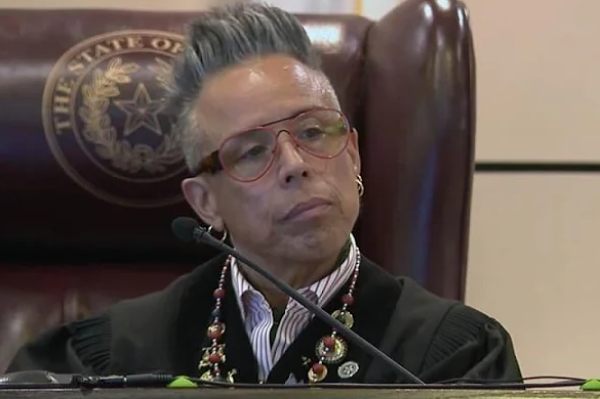Evil is in the eye of the beholder

The current jaw-dropping atrocities being committed by Hamas have once again restarted the debate on evil and what it really is because, after all, “one man’s terrorist is another man’s freedom fighter,” right?
Actually, no.
As Supreme Court Justice Potter Stewart observed in the 1964 case of Jacobellis v. Ohio, while hard-core pornography is hard to define, “I know it when I see it.” The same is true of evil.
But don’t tell that to supposed experts who say the most amazing things.
For example, commenting on the subject of evil, criminal psychologist Julia Shaw approvingly quotes German philosopher Friedrich Nietzsche who wrote, “Thinking evil means making evil.” You’re probably wondering, OK, what exactly does that mean?
Shaw goes on to say, “Evil is only created in the moment when we perceive something as such. And just as quickly as we can make evil, if our perception shifts, it can disappear. We make evil when we label something so. Evil exists as a word, as a subjective concept. But I firmly believe there is no person, no group, no behavior, no thing that is objectively evil. Perhaps evil only really exists in our fears.”
Really? If evil isn’t real, then why did Jesus ask us to pray, “Deliver us from evil” (Matt. 6:13)?
Further, try saying evil isn’t real to the Jewish people who have been on the receiving end of Hamas’ brutality or even those here in America reading social media posts like those from now-former Citigroup banker, Nozima Husainova, who shared a post on Instagram spreading the lie that Israel destroyed the al-Ahli Baptist Hospital in Gaza, and added a note that read: “No wonder why Hitler wanted to get rid of all of them” with a smiley emoji at the end.
An interesting thing about Shaw’s quote from Nietzsche, which comes from his book The Dawn of Day, is that it’s pulled from a section in the work that is another one of his incessant assaults against Christianity and God’s moral law. In the book, Nietzsche twists Paul’s writings about Law and Grace and argues that Paul was in favor of deep-sixing objective moral truth.
Nietzsche wrote that Paul reached a point where the apostle thought, “What if it were necessary to get rid of the law?” and goes on to say “For he [Paul] is from now on the teacher of the annihilation of the law … This is the first Christian.”
I guess Nietzsche never got to Paul’s line in Romans 7:7 — “Well then, am I suggesting that the law of God is sinful? Of course not!” (NLT).
So, what’s the motivation for Nietzsche saying such things? If he and his disciples like Shaw can demonstrate that even Christians don’t believe in objective morality, it’s only a few small steps more towards eliminating God, which then provides humankind with what Nietzsche desperately longed for — ultimate personal moral freedom in making right and wrong decisions.
This leads to Dostoevsky’s famous statement of, “Without God, all things are permitted.”
While almost everyone has heard that quote, most have never read a lesser-known statement of his that came as he pondered a scenario many years ago similar to what’s occurring now in the Middle East when a Muslim empire (the Ottomans) persecuted colonized Christians.
Like now, whole families back then were wiped out; women abused and raped; corpses defaced; children meticulously murdered before their parents’ eyes; and, in one case that particularly shocked Dostoevsky, a young child forced to watch her father being flayed alive.
Dostoevsky warned that the same thing could happen even in the most sophisticated and educated societies: “For the moment it is still against the law,” he wrote, “but were it to depend on us, perhaps, nothing would stop us despite all our civilization.”
A hot mess
This is where all the hard work of moral nihilists such as Nietzsche and those like him has got us. As Dostoevsky warned, it’s a place where all the formal education in the world can’t pull our culture out of the hot mess we’re in.
Discussing how some in elite schools are cheering on the destruction of Israel and the Jewish people, Peggy Noonan says in The Wall Street Journal: “… we seem to be raising a generation whose most privileged and educated members appear to be incapable of making moral distinctions. They made me think of the Oxford Union vow, in 1933, not to fight for king and country: High-class dopes always get it wrong.”
It seems that way, doesn’t it? Noonan’s statement reminds me of Malcolm Muggeridge’s cultural observation that “whereas other civilizations have been brought down by attacks of barbarians from without, ours had the unique distinction of training its own destroyers at its own educational institutions, and then providing them with facilities for propagating their destructive ideology far and wide, all at the public expense.”
Not everyone goes along with such damaging campaigns, but when those in the culture become afraid, bullied, or embarrassed to resist, “where would we find ourselves: among the flayed or among the flayers?”, asks Dostoevsky.
Such an end result is sad but not surprising when you dethrone God and trash His moral prescriptions, because “The heart is more deceitful than all else and is desperately sick; who can understand it?” (Jer. 17:9).
If that’s true — and it is — then we can’t trust ourselves to make the correct moral calls and need to look outside of ourselves for a standard and authority to trust regarding right and wrong. As Christians, we say those two things are God and His Word but opponents argue against that for a number of reasons.
The most popular argument has been the Euthyphro dilemma — is something good because God approves it, or does God approve something because it’s good? The first makes God arbitrary, while the second makes “good” independent of God.
Although skeptics love the supposed dilemma, taking down the argument isn’t hard. God is the greatest possible being, so His nature is what grounds absolute moral right/wrong. Because He has no obligations to anything outside of Himself, God simply acts, and what He naturally does is good because it comes from His nature/essence.
Understanding this makes compliance to God and His moral law a peaceful and joyous event.
It also solves the issue of multiple little gods (us) running around with morals that conflict with one another. Apparently oblivious to this kind of outworking chaos, Shaw writes:
“When we learn that evil is in the eye of the beholder, we begin to question the beholder and the society they live in … Because of what I consider an insurmountable problem of subjectivity, I think that neither humans nor actions should be labeled evil. Instead, I cannot help but see a complex ecosystem of decisions, cascades of influences, multifaceted social factors. I refuse to summarize all of this into a single hateful word.”
Heavy sigh.
But I will agree with her on one thing — evil is in the eye of the beholder. But only as long as that “beholder” is God.
Because “A good tree cannot produce bad fruit” (Matt. 7:18), God’s ways will always bear good fruit where moral decision-making is involved. That being the case, our prayer as a fellow beholder of good should be, “Open my eyes, that I may behold wonderful things from Your law” (Ps. 119:18).
Robin Schumacher is an accomplished software executive and Christian apologist who has written many articles, authored and contributed to several Christian books, appeared on nationally syndicated radio programs, and presented at apologetic events. He holds a BS in Business, Master's in Christian apologetics and a Ph.D. in New Testament. His latest book is, A Confident Faith: Winning people to Christ with the apologetics of the Apostle Paul.





















